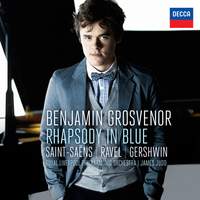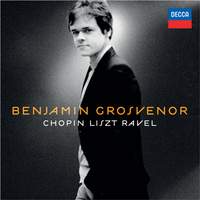Interview,
Benjamin Grosvenor - a postscript
 It's been a good while since we've had quite so much enthusiastic feedback about a disc featured in our weekly newsletter as there's been over the past couple of days - many of you have been in touch over email to let us know how much you're enjoying Dances and to share your memories of Benjamin's live performances, so I dropped the man himself a line to find out a little more about how the programme came into being…
It's been a good while since we've had quite so much enthusiastic feedback about a disc featured in our weekly newsletter as there's been over the past couple of days - many of you have been in touch over email to let us know how much you're enjoying Dances and to share your memories of Benjamin's live performances, so I dropped the man himself a line to find out a little more about how the programme came into being…
Where did the idea of a programme based on dance come from?
>The idea is not quite original. I read about a 1909 letter from Busoni to his pupil Egnon Petri proposing a dance-themed programme for some of his recitals. It was a very varied programme, comprised of original works by many composers, as well as Busoni's own compositions and transcriptions, moving roughly chronologically. I thought there was a lot of scope to this theme, and wanted to construct one of my own using a similar model.
And with such a huge range of material available, how did you select the repertoire for this disc? Was there anything you wanted to include which didn't make the final cut? >My goal was to present a programme that combined both familiar and more obscure gems from the repertoire. I had chosen the pieces initially for a recital programme, so it was constructed at first with certain pacing in mind. There was a danger in this theme in ending up with too many miniatures, and I wanted a first half to my programme that had some weight to it. I had been playing the Bach Partita the season before constructing this particular programme, and so included this as a substantial large-scale work to feature in the recital. >After Bach, a composer I felt I really had to include was Chopin, who explored dance forms more than any other composer with his sets of Mazurkas, Polonaises and Waltzes. Again, as this was the first half of the programme, I was interested in works on a larger-scale and so looked at the Polonaises. Two are included that show the emotional range in this form - the tragic op.44, and the quicksilver op.22, full of pathos, wit and charm in equal measure.
>The next half I wanted to fill with more exotic rarities. Of Scriabin, I chose some his earliest works, five of his mazurkas op.3 (three of which made it to the disc), which are quite Chopinesque in style, and so follow on nicely from the Polonaises. His Valse op.38 shows his middle period style - an ecstatic waltz-in-the-skies. Having introduced this new dance form, I thought I would stay with it for the rest of the recital. I've always had an attraction to Spanish music, so I looked into Granados, and found this set of waltzes. They're not particularly 'Spanish', but are a charming and varied set. >The recital proper ends with Schulz-Evler's imaginative transcription of the Blue Danube Waltz. I then recorded a number of short works of encore length which I've added to my repertoire over the years. Two of these close the disc (Godowsky's heady transcription, and Morton Gould's Boogie Woogie Etude, brining us into more modern times) and some others are available for downloads on iTunes. There was certainly much that I disregarded in putting this together, and I'm sure with such a broad theme, much that was overlooked!
You've spoken in previous interviews about balancing listening to older recordings with allowing your own interpretation to develop independently - were there any particular recordings of any of these works which attracted or influenced you?
>I've loved the Bach in particular for many years since I heard a friend play it. Though he never recorded this work, I think my Bach playing has been influenced in particular by Samuel Feinberg, whose wonderful recording of the Well-Tempered Clavier uses the full colouristic potential of the instrument.
Lastly, are you much of a dancer?! >I love to dance. Sadly, my body is always two bars behind and in the wrong key.
Other recordings by Benjamin Grosvenor
Benjamin's 2012 disc of concertos by Ravel, Saint-Saens and Gershwin with the Royal Liverpool Philharmonic Orchestra prompted BBC Music Magazine to 'concur with other critics who hear in his tone and phrasing echoes of a golden age' and Gramophone to judge him 'at the least, a talent in a thousand'.
Available Formats: MP3, FLAC, Hi-Res FLAC
Described by International Record Review as 'quite superlative in every way', this 2011 release won a slew of awards and nominations, including the Gramophone Instrumental Prize which also led to Grosvenor being crowned their Young Artist of the Year.
Available Formats: MP3, FLAC




